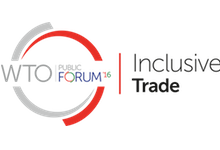How can ACP countries harness digital innovation as a ritical enabler for promoting inclusive trade?
27 Sep 2016 13:00h - 14:30h
Event report
[Read more session reports and live updates from the 2016 WTO Public Forum.]
Important questions regarding the participation of the African, Caribbean and Pacific Group of States (ACP) in the digital economy were discussed during the WTO Public Forum 2016, in the framework of a workshop organised by the ACP Geneva Office and the Friedrich-Ebert-Stiftung Geneva Office. The workshop’s key topic was summarised in one question: How can ACP countries harness digital innovation as a critical enabler to promote inclusive trade?
At the start of this one-hour session, Marwa Kisiri, Head of the ACP Geneva Office, underlined the importance of initiating new programmes and assisting ACP countries to increase their presence in the global trade, and to raise the role of digital innovation in the process. Yvonne Theeman, Senior Programme Officer for Trade and Development at Friedrich Ebert Stiftung (FES) in Geneva, and session moderator, insisted that ACP countries are still being left behind when it comes to the digital economy.
As a core example, Roy Ombatti, founder of African Born 3D Printing in Kenya (AB3D), presented some of the concrete challenges he faces every day with his Kenyan-based start-up. His company produces 3D printers from local recycled waste, and supports new skills in Kenya. On a daily basis, difficult access to the digital economy and the lack of connectivity preclude some important transactions. According to Ombatti, because of difficulties accessing the digital market, he has had to turn down several orders and cannot benefit from advice on running his firm efficiently, or interest from potential investors.
In order to provide diverse solutions to these kinds of issues, some initiatives were presented, especially by Daniela Zehentner-Capell, Head of Division, Trade-related Development Cooperation at the Federal Ministry for Economic Cooperation and Development (BMZ) in Germany. The German government has been working on several undertakings including approximately 260 ICT projects in ACP countries. It aims to join forces with the private sector and to apply ICT solutions for health and education. She also presented a subproject, Lab of tomorrow, that encourages exchanges with African entrepreneurs in order to promote business operations between the African continent and Germany. Zehentner-Capell concluded her presentation by stating that ‘now it is a question of bringing people together.’
Cécile Barayre, Economic Affairs Officer, ICT Analysis Section, Division of Technology and Logistics at the United Nations Conference on Trade and Development (UNCTAD) was the last speaker from the panel of experts. She presented the eTrade for All Initiative, a global partnership to assist ACP countries. Targeting inclusive trade and job creation, its purpose is to unlock the potential of e-commerce for developing countries. Its principal goals are to improve connectivity, develop new e-commerce platforms, and to support e-commerce companies. It provides access to financing, e-commerce strategies, ICT infrastructure, payment solutions, e-commerce skills, and a legal framework.
by Ana Andrijević
Related topics
Related event

